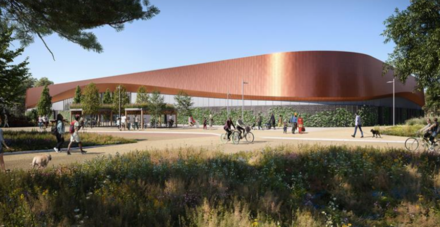
November 20, 2020
Published by Building in November 2020.
Faulkner Browns has won planning for London’s first Olympic-size twin-pad ice rink.
The £30m facility will be built in the Lee Valley Regional Park which is also home to the architect’s 2012 Olympic white water centre.
It was approved by Waltham Forest council and will now go to the GLA for a final decision.
The wider project team includes project manager Wrenbridge Sport, structural and civil engineer Enginuity, MEP engineer Max Fordham and landscape architect LDA Design.
The Lee Valley Ice Centre, which will boast two Olympic-size rinks, is to replace a smaller venue which has reached the end of its operational life after 36 years. Despite this it is one of the UK’s most popular ice rinks, with nearly 280,000 visits a year.
The new larger building will double capacity to 557,000 visits a year and will expand the range of activities that can be run concurrently. As well as two rinks and capacity for 800 spectators, it will have a gym, exercise studios and a café.
It will be reoriented in response to movement analysis showing the current facility interrupted key routes through the park. It has also been designed to try and create a welcoming gateway to neighbouring Leyton Marsh.
The site stands in protected Metropolitan Open Land and the north-west corner is designated a Site of Metropolitan Importance to Nature Conservation, which extends along the edge of the River Lea to the north.
The building is designed to resemble a pavilion with no front or back. It sits on a heavyweight plinth above which are the ice halls, contained internally with insulated cladding panels and wrapped externally in a copper-coloured, metal-clad band which lifts to reveal the interior.
Roof-mounted photovoltaic panels will generate energy while melted ice will be filtered through reed beds and used to create new wetland habitats.